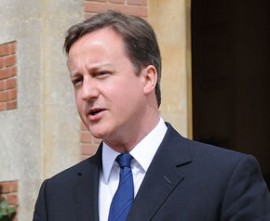
By the standards of Tony Blair’s speeches on the battle for democracy in the Middle East, David Cameron’s speech to the Kuwait National Assembly on Tuesday was a welcome breath of fresh air. Not for him the grand pronouncements and the Manichaean vision; instead, there was a more modest and realistic assessment of what was possible and achievable. (Remember ruefully that Blair started out as a non-ideological advocate of “what works”.)
But this wouldn’t be the Federal Union blog if it didn’t find a few things to complain about. So here goes.
The basic thrust of David Cameron’s speech was that democracy, in his words, “is a process not an event”. There is more to democracy than voting alone. There are other institutions that need to be created: “the independence of the judiciary, the rights of individuals, free media and association, and a proper place in society for the army.” And “It can’t be done overnight.”
On this basis, Kuwait is a good example of what he is talking about:
“just look around this National Assembly elected by universal suffrage where every community is represented where men and women sit side-by-side and where Ministers are held to account.”
Freedom House describes Kuwait as “partly free” – 4 marks out of 7 for both political rights and civil liberties – but it does not appear on its list of electoral democracies. Still, compared with other countries in the region – Saudi Arabia half a mark, Iran 1 out of 7, Iraq 1.5 – Kuwait is doing pretty well.
This notion of development over time is exactly the understanding of democracy represented by Jean Monnet’s method for building the European Union. As it says in the Schuman Declaration:
“Europe will not be made all at once, or according to a single plan. It will be built through concrete achievements which first create a de facto solidarity.”
The building of democracy, whether in Egypt, Libya or the European Union, is not instant. If you want a tree in your garden, you can’t plant one: you have to plant a sapling, and nurture it so that in time it grows into a tree. Let us hope that next time there is Eurosceptic criticism of the EU for lacking a political party system as strong as that which exists within a member state of the EU, David Cameron will repeat that statement that “it can’t be done overnight.”
The second gripe relates to the idea that people want “greater, popular participation in Government”. Again, this blog agrees. In fact, we would go further and say not only is it a desire, it is in fact a right. A citizen’s participation in the process of government is as much a right as the citizen’s right not to be tortured. It is against this background that the debate about the prisoners’ right to vote should be considered.
The prime minister may say that the thought of prisoners voting makes him “physically ill” (or is it the thought of what certain newspapers might say about him if prisoners were to get the vote …) but a political leader who can travel to Egypt and the Gulf states to call for democracy in the aftermath of a revolution has surely got a strong stomach.
Prisoners are not outlaws. They have rights too, rights which need to be defended. How we defend them is an expression of our democracy, just as surely as the election of the Kuwait National Assembly is an expression of theirs.
